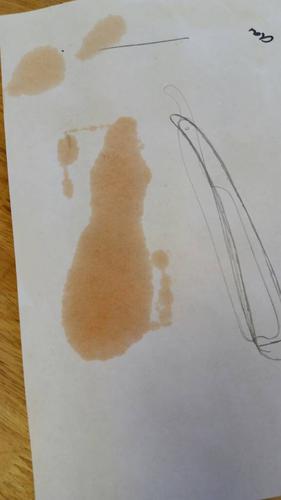Results 1 to 7 of 7
Thread: Oil Stone leaks
-
02-08-2016, 06:43 PM #1Senior Member

- Join Date
- Sep 2015
- Posts
- 695
Thanked: 77 Oil Stone leaks
Oil Stone leaks
Have any of you had a old oil stone leak

-
02-08-2016, 06:51 PM #2

yes with synthetics, much less so with naturals.
Synthetics tend to be pretty porous. And I keep any I own in containers and hone with a small baking tray under them. Snap style lid containers are good for this as they stop dust and bits sticking to the hones. It also keeps the black oil contained.
Naturals I just put a cloth down and have a good wipe up afterwards, They don't absorb the oil much more than the surface on a lot of the harder rocks like Arkansas and CF. A good wipe and wash afterwards in soapy water then they can be wrapped in cloth and put back into the regular hone box. The under hone cloth normally just goes into the washing machine with everything else, washing powder doesn't seem to have a problem with light mineral oils at all.Last edited by Iceni; 02-08-2016 at 06:55 PM.
Real name, Blake
-
02-08-2016, 07:00 PM #3Senior Member

- Join Date
- Sep 2015
- Posts
- 695
Thanked: 77
This stone happens to be Washita and it looks like someone put engine oil on it.
-
02-08-2016, 09:04 PM #4

Well the old oil can be removed by soaking the stone.
What you use to soak will depend on the stone more than anything. Degreaser/water is pretty universal, So is washing powder/water. Harsher chemicals might not be suitable or could even eat into the stone if it reacts to strong alkali/acids.
Boiling the stone in the degreaser can speed up the rate of oil removal but you may damage the hone. There are various boiling methods from a pan on a hob, to a crock pot in the oven.
Some people will also go as far as to soak the stone in a strong solvent like celulose thinners, petrol, or paraffin. You do this at your own risk again.
Personally I'd stick it in a bucket with a load of washing up liquid, and leave it somewhere warm like next to a radiator in the house, then do a water swap every day until the stone is clear. Then I would let it dry for a week before adding new oil.Real name, Blake
-
02-08-2016, 09:42 PM #5

Looks like the automatic transmission oil that was/is sold as honing oil. Never cared for it though it worked OK.
Cheers, Steve
-
02-08-2016, 10:02 PM #6Senior Member


- Join Date
- May 2014
- Location
- Bryan, TX
- Posts
- 1,251
Thanked: 228
Maybe soaking in Simple Green would work pretty good too.
Mike
-
02-09-2016, 05:07 AM #7Senior Member

- Join Date
- Sep 2013
- Location
- NW Indiana
- Posts
- 1,060
Thanked: 246
Washitas leaking is not at all uncommon. They range in porosity but the more porous ones can soak up - and consequently - leak out, plenty of oil. I keep my Washitas in a bin of light oil personally. It's about 1/4" deep so only the tops of the stones soak. I have one very porous one and four denser, finer ones, including a Norton #1 and a Lily White. Good stones, congrats.
For initial cleanup of an old stone I use straight Simple Green in a heated ultrasonic cleaner - I also add a dishwashing tablet. This results in a Washita that starts out basically black and unidentifiable transforming into a nearly pure white brand new looking stone.
I only use this method on natural stones though, some synthetics can be permanently damaged or softened by harsh chemical cleaners.Last edited by eKretz; 02-09-2016 at 09:50 AM.


 4Likes
4Likes
 LinkBack URL
LinkBack URL About LinkBacks
About LinkBacks






 Reply With Quote
Reply With Quote